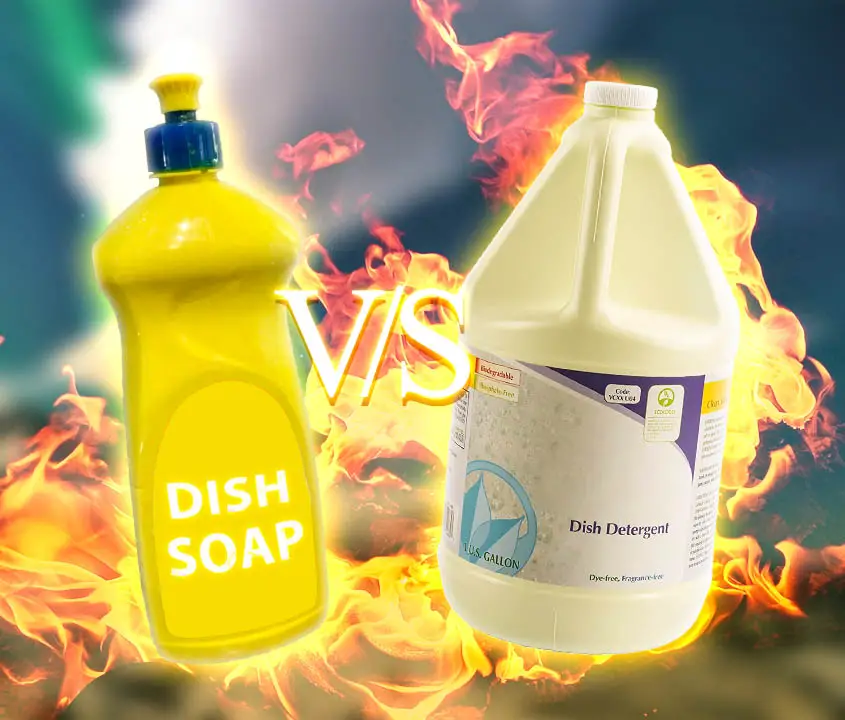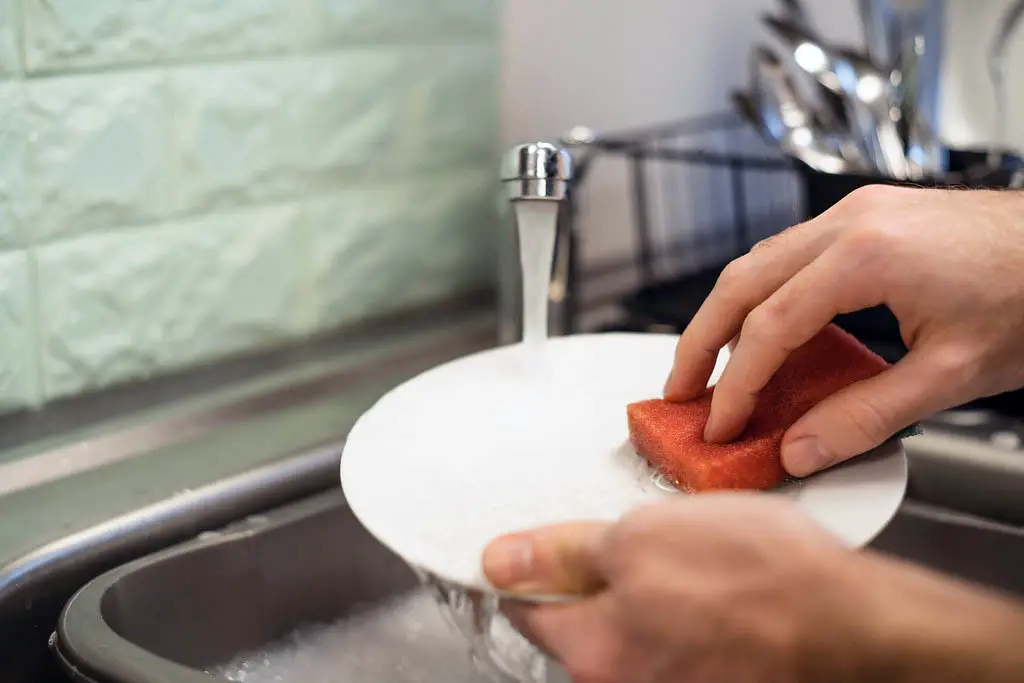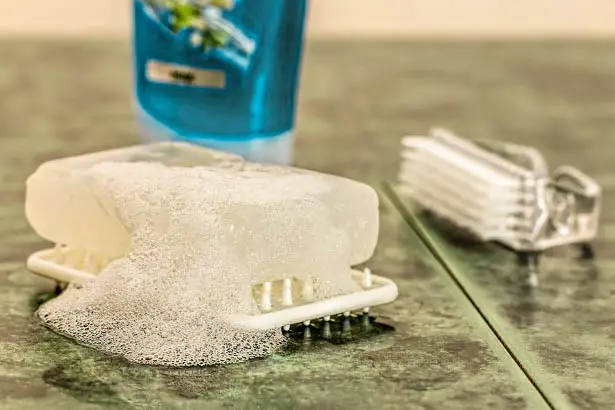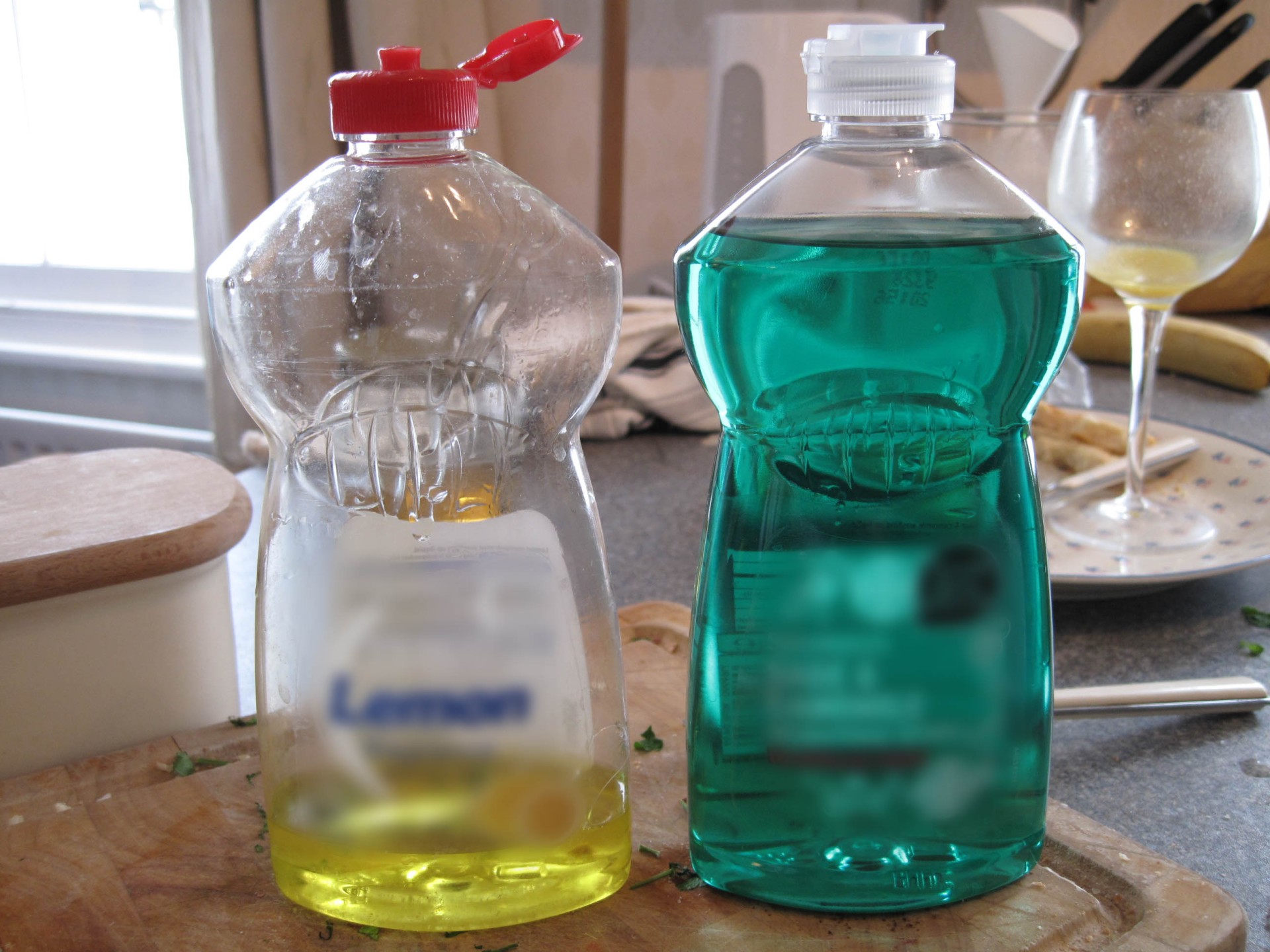Between various dish soaps and detergents, you might have wondered which would be the best to clean dishes with. Right after the moment the thought crosses your mind, I guess, you start browsing on dish soap vs dish detergent.
Technically, dish soap and dish detergent are the same thing that they are dishwashing agents. However, these agents are not as simple as their definitions.
The confusion between ‘soap’ and ‘detergent’ may lead you to buy the wrong product. And unexpected damages would be the next picture. Will you let that happen?
Obviously not. Then you need a proper guideline – like this article you are going to read now – to make your dishwashing safe and enjoyable.
Dish Soap Vs Dish Detergent
In short, both effectively wash dishes. The former has milder ingredients, the latter has powerful stain-removing characteristics. In the debate of dishwashing detergent vs dish soap, dishwashing detergent gets less score due to some reasons.
What Is Dish Soap?
Dish soap refers to the soap that cleans dishes, pots and pans, and other kitchen items with water. In general, it includes all types of automatic and manual dish cleaning agents. However, dish soap mainly indicates manual cleaning agents, more specifically dishwashing liquid, to avoid confusion.
Pros And Cons Of Dish Soap
When it comes to safe dishwashing by hands, liquid dish soap is better than solid dish soap. However, the superiority does not make the soap flawless at all. Know the positive and negative sides of dish soap below in brief.
Pros
- More foam makes dishwashing easier.
- Applicable on clothes, tile and concrete floors, jewelry, hairbrushes, combs, kitchen cabinets, and carpets.
- Protects skin.
- Easily soluble in water.
- A cost-effective solution.
Cons
- Reacts with food if not rinsed off properly.
- Increases plastic usage.
What Is Dish Detergent?
Dish detergent is one kind of dish soap that only works in an automatic dishwasher. Also known as dishwasher detergent, this soap is more powerful than liquid or solid dish soaps.
Dish detergent can be powdered, liquid, or like hard candies or tablets. Unlike dish soap, dish detergent is detrimental for knives or anything with sharp edges.
Pros And Cons Of Dish Detergent
Before you purchase an automatic dish detergent, it would be wise to know its harms and benefits in advance. Below are the pros and cons of this cleaning agent.
Pros
- Less foam prevents overflow.
- Less use of water.
- No stickiness inside the machine.
- Protects dishwasher metals from corrosion.
- Applicable on bathtub stain and car leak stain.
Cons
- Comparatively expensive.
- Harsh for skin.
Dish Soap Vs Dish Detergent: Similarities
Is dish soap and dish detergent the same? Well, by definition, they are the same. Dish soap includes dishwashing liquid, dish detergent, and dishwashing bar. All dish detergents can be dish soap, but not all dish soaps are dish detergent.
Both dish soap and dish detergent have some common ingredients –
Surfactants (reduce the product’s surface tension and allow water to wet the entire dish surface).
Enzymes (remove dirt, stains, burn marks, and sticky food residue).
Builders (prevent hard water from colluding with the dish soap/detergent).
Preservatives (make the cleaning agent long-lasting).
Antibacterial and disinfectant ingredients (some dish soaps and detergents contain them).
Colors and fragrances.
Dish Soap Vs Dish Detergent: Differences
Despite having the common goal, that is to wash dishes – they do their job in different ways. A deep knowledge about the differences between these two soaps will protect your hands and household. Therefore, don’t skip this section and read thoroughly.
Form
Dish soap can be solid and liquid. In contrast, dish detergent comes as powder, liquid, pods, or tablets.
Washing Method
Dish soap is for manual or hand-held dishwashing while dish detergent is for automatic dishwashing. Manual dishwashing takes more time than automatic dishwashing.
Active Ingredients
Active ingredient refers to the ingredient which does the most of the work of the product. Water is the main active ingredient of dish soap or dishwashing liquid.
In dishwashing detergent, triclosan and phosphates are the active ingredients. Some dish soaps may contain triclosan and/or phosphates, but not all.
Safety
The presence of triclosan and phosphates in dishwashing detergent makes it dangerous for the environment.
Triclosan kills bacteria and fungus but hinders the microbial breakdown of wastes. Phosphates are another potential ingredient which breaks down dish dirt.
If they reach water bodies through a drainage system, algae bloom will happen. It will end in disrupting water oxygen levels and the ecosystem.
Bleaching
Dishwashing detergent contains high pH and harmful chlorine bleach. These are threats to the hand health.
On the contrary, dishwashing liquid or dish soap contains lower pH and lacks bleach. Hence it is safe for both the hands and environment.
Solubility
Dish soap easily dissolves in water, and mixing it with warm water will enhance its cleaning ability. In contrast, dish detergent requires warm water to dissolve.
Soap suds
Dishwasher detergent is terrible at making soap suds. It uses enzymes instead of suds to break down dirt, food, and grease.
This is why it is only usable in automatic dishwashers. No spilling will happen, and dishes will come squeaky clean.
On the other hand, an amazing amount of soap suds comes from a small amount of dishwashing liquid. The more the suds, the easier and faster the dishwashing will be. This liquid is prohibited to use in a dishwasher.
Savings
Each manual dishwashing session with dish soap can save your money and water.
A small amount can wash piles of dishes on-the-go, followed by easy rinsing off. If you use dish detergent instead of dish soap for hand washing, you might end up using more detergent to get the desired foam.
Chances are high that using more detergent will leave soap residue on the dishes. You will have to rinse off the dishes repeatedly, which is a waste of water.
Likewise, don’t pour dish soap in an automatic dishwasher unless you want a sudsy mess and waste your time and energy.
Stickiness
Dish detergent does not stick to the metal surface of the dishwasher. However, dish soap sticks and causes corrosion inside of the machine. The soap deposits left by dish soap are easy to clean but hard to find.
Price
Both dishwashing liquid and dishwasher detergent are expensive, but the former costs less than the latter. Even in various forms of dishwasher detergent, pods or tablets are more expensive than powder.
Dish Soap Or Dish Detergent: Which One Is Better?
Neither dish soap nor dish detergent is solely better than each other. Both are usable, depending on where and how you will use these cleaning agents.
For manual dishwashing, use a dishwashing bar and/or liquid. Liquid dish soap is highly recommended since it has milder, skin-friendly ingredients. Using a dishwashing bar may hamper the nails and skin.
For a dishwasher machine, use dishwashing tablets, powders or liquids manufactured only for the dishwasher.
FAQ
Is Dish Soap The Same As Dish Detergent?
Dish soap is the same as dish detergent in terms of definition and functionality. However, they have different solubility, active ingredients, suds level, prices, and orientations to the skin.
Can You Use Detergent As Dish Soap?
Depends on which detergent you are talking about. If it is laundry detergent, drop the thought. Laundry detergent has ingredients that don’t wash off easily and can react with food. If it is dish detergent, only use it as dish soap in a dishwasher machine.
Can You Substitute Dish Soap For Dishwasher Detergent?
Yes, you can, but you also need to add baking soda in the soap slot of the dishwasher. First, put 3 drops of liquid dish soap in the slot. Later, fill three quarters of the slot with baking soda. This mixture will not overflow and spill.
Verdict
The purpose of this long article is to provide an exact answer to the debate of dish soap vs dish detergent. And surely you have already come to know using either one as the substitute for the other is acceptable.
All you need to do is to keep the conditions in mind before applying them on dirty dishes. Always read the ingredients and instructions labelled at the packaging first.
In this way, you will have an in-depth knowledge of the purchased product. Be alert and avoid these kinds of awful unwanted situations.
Also read Why Does My Mouth Taste Like Soap?





